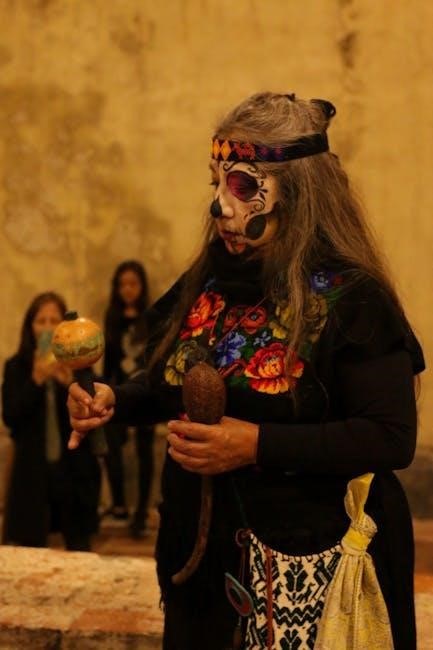Ancestor spirit guides are believed to offer wisdom, healing, and protection, connecting individuals with their lineage. This practice, rooted in cultural traditions, emphasizes respect and reverence for ancestral wisdom, providing a bridge between the past and present to foster personal growth and healing.
Definition and Overview

Ancestor spirit guides are the spirits of deceased family members offering wisdom, healing, and protection. They can be immediate ancestors, like deceased loved ones, or distant ones unknown to the individual. These guides connect individuals to their lineage, providing insights and support. They assist in clearing generational trauma and accessing ancient knowledge. Communication involves practices like meditation or using divination tools such as pendulums. This connection is sacred, leading to personal growth and well-being. Honoring these guides allows individuals to tap into their heritage for guidance and healing, fostering a deeper understanding of their roots and identity. Many cultures view this connection as vital for spiritual and emotional balance.
Historical and Cultural Significance
Ancestor spirit guides hold profound cultural and historical importance across various societies. Many indigenous cultures have long revered ancestors as intermediaries between the living and the spiritual realm. These beliefs are deeply rooted in traditions that honor lineage and heritage. In several African and Asian cultures, ancestor veneration is a cornerstone of spiritual practices, ensuring continuity and wisdom. Indigenous traditions worldwide emphasize respect for ancestors, viewing them as protectors and sources of guidance. This historical significance reflects a universal human desire to connect with the past and honor those who have shaped our present. Such practices underscore the enduring value of ancestral wisdom in fostering identity and community cohesion.
The Role and Significance of Ancestor Spirit Guides
Ancestor spirit guides provide wisdom, protection, and healing, serving as bridges between the living and the spiritual realm. They offer guidance, clarity, and support, aiding in personal growth and resolving generational trauma, while fostering a deep connection to one’s heritage and lineage.
Guidance and Wisdom from Ancestors
Ancestor spirit guides provide profound guidance and wisdom, drawn from their life experiences and knowledge. They often communicate through meditation, offering insights to navigate life challenges and make informed decisions. Their wisdom can help individuals understand their purpose and overcome obstacles, fostering personal growth and resilience. Additionally, ancestors may share ancient traditions and healing practices, preserving cultural heritage. This connection not only enriches one’s life but also strengthens the bond with their lineage. By seeking ancestral wisdom, individuals can gain a deeper understanding of themselves and the world, leading to a more fulfilling and meaningful existence.
Healing and Protection Through Ancestral Connection
Ancestral connections offer profound healing and protection, addressing emotional, spiritual, and even physical wounds. Through rituals and meditative practices, individuals can tap into the wisdom of their ancestors, clearing generational trauma and fostering emotional balance. Ancestor spirit guides are believed to provide safeguarding energies, protecting their descendants from negative influences. This connection not only heals past hurts but also strengthens resilience, enabling individuals to face life challenges with greater courage. By honoring and communicating with ancestors, people can experience transformative healing and gain a sense of security, knowing they are supported by loving guides from their lineage. This ancestral bond serves as a powerful tool for restoration and empowerment.

Types of Ancestor Spirit Guides
Ancestor spirit guides include immediate ancestors, such as deceased loved ones, and distant ancestors, like unknown relatives from earlier generations, both offering wisdom and support.
Immediate Ancestors (Deceased Loved Ones)
Immediate ancestors are deceased loved ones, such as parents, grandparents, or siblings, with whom one shares a direct emotional and familial bond. These spirits often provide comfort, guidance, and wisdom based on their life experiences. They may communicate through vivid dreams, intuitive feelings, or symbolic signs. Many believe these ancestors continue to influence their descendants’ lives, offering support during challenging times. Their presence can serve as a healing force, helping to clear emotional blockages and resolve unfinished matters. Connecting with immediate ancestors often involves personal rituals, such as meditation or creating altars, to honor their memory and seek their counsel. This connection can foster a deep sense of continuity and belonging.
Distant Ancestors (Unknown Relatives)
Distant ancestors are unknown relatives from earlier generations, often beyond personal memory or family records. These spirits may still influence an individual’s life, offering guidance rooted in shared lineage and cultural heritage. Their presence can manifest through subtle intuitive nudges or recurring symbolic themes. Some believe these ancestors act as guardians, protecting their descendants from harm or misfortune. Connecting with distant ancestors often requires rituals or meditative practices to bridge the gap between past and present. Their wisdom can provide insight into unresolved family patterns or inherited traits, aiding in personal growth and healing. While their identities may remain unclear, their influence can be deeply transformative, fostering a sense of connection to one’s broader ancestral lineage.

Methods of Communication with Ancestor Spirit Guides

Communication with ancestor spirit guides often involves meditation, rituals, and tools like pendulums or divination. These practices help bridge the spiritual and physical realms, fostering connection and dialogue.
Meditation and Ritual Practices
Meditation and ritual practices are fundamental for connecting with ancestor spirit guides. These practices create a sacred space for communication, allowing individuals to honor their ancestors and seek guidance. Setting intentions is crucial, as it clarifies the purpose of the connection. Meditation helps quiet the mind, making it easier to receive messages from the spiritual realm. Rituals, such as lighting candles or burning incense, enhance the spiritual atmosphere. Some traditions involve offering food, drinks, or flowers to show respect and gratitude. These practices not only foster a deeper connection but also provide a sense of comfort and healing. Regular meditation and rituals strengthen the bond with ancestor spirit guides, enabling individuals to access ancient wisdom and healing energies. This spiritual dialogue fosters personal growth and intergenerational understanding.
Use of Pendulum or Divination Tools
Pendulums and divination tools are popular methods for communicating with ancestor spirit guides. These tools act as bridges, helping individuals discern guidance from their ancestors. By asking specific questions, one can receive clear yes or no answers, facilitating intentional dialogue. Pendulums, in particular, are valued for their simplicity and effectiveness in conveying messages. Many find that using these tools enhances clarity and trust in the communication process. Regular practice with divination tools strengthens the connection, allowing for deeper understanding and wisdom. This method is especially helpful for those seeking precise guidance or validation from their ancestral guides. It is a practical and accessible way to engage with the spiritual realm and honor ancestral wisdom.

Benefits of Connecting with Ancestor Spirit Guides
Connecting with ancestor spirit guides promotes healing, clears generational trauma, and grants access to ancient wisdom, fostering personal growth and resilience through ancestral support and knowledge.
Clearing Generational Trauma
Connecting with ancestor spirit guides can facilitate the clearing of generational trauma, which is passed down through families. By engaging with ancestral energies, individuals can identify and release inherited patterns, emotions, and beliefs that no longer serve them. This process often involves rituals, meditation, or divination tools to communicate with ancestors, seeking their guidance in healing unresolved wounds. Through this connection, individuals can break cycles of pain and dysfunction, fostering liberation and renewal. The wisdom of ancestors helps restore balance, allowing individuals to move forward with greater clarity and emotional freedom, while honoring the legacy of their lineage in a transformative way.
Accessing Ancient Knowledge and Healing Powers
Connecting with ancestor spirit guides allows individuals to tap into ancient wisdom and healing powers, offering insights into traditional practices and remedies. Through this connection, one can access knowledge passed down through generations, such as herbal medicine, spiritual rituals, and holistic healing techniques. Ancestors often share their expertise to address modern health challenges, providing solutions rooted in timeless wisdom. This access not only enhances personal well-being but also preserves cultural heritage, ensuring the continuation of valuable traditions. By honoring ancestral wisdom, individuals can integrate these ancient practices into their lives, fostering a deeper understanding of natural healing and spiritual balance, while paying tribute to their lineage’s enduring legacy.
Cultural Practices and Traditions
Cultural practices honoring ancestor spirit guides include rituals, ceremonies, and offerings to seek wisdom and protection, preserving traditions that strengthen familial and communal bonds across generations.
Examples from Indigenous Cultures
Indigenous cultures worldwide have revered ancestor spirit guides through rituals and ceremonies, honoring their wisdom and presence. Native American tribes often perform ancestor ceremonies to seek guidance and healing, believing these spirits offer protection and wisdom. In African traditions, rituals like pouring libations and offering prayers connect the living with ancestral spirits, ensuring harmony and balance. Similarly, many Asian cultures observe ancestor worship through altars and seasonal festivals, believing spirits continue to influence daily life. These practices underscore the deep respect and connection indigenous peoples maintain with their ancestors, viewing them as vital links to cultural heritage and spiritual strength.

Modern Adaptations of Ancestral Practices

Modern adaptations of ancestral practices blend traditional rituals with contemporary tools, making them accessible to a wider audience. Many people now use meditation, journaling, and digital apps to connect with ancestor spirit guides. Workshops and online communities have emerged, teaching how to honor ancestors through creative rituals. Some incorporate psychology, viewing ancestors as symbols of collective wisdom and personal growth. These adaptations emphasize the healing potential of ancestral connections, such as clearing generational trauma and accessing ancient knowledge. By merging old traditions with new methods, modern practitioners keep the essence of ancestral reverence alive while making it relevant to today’s fast-paced world.
Connecting with ancestor spirit guides offers a profound way to heal, seek wisdom, and honor one’s heritage. This practice, deeply rooted in cultural traditions, provides a meaningful bridge between the past and present. By fostering a respectful and mindful relationship with ancestral spirits, individuals can access ancient knowledge, clear generational trauma, and find guidance in life’s challenges. Modern adaptations ensure these practices remain relevant, blending tradition with contemporary tools. Ultimately, ancestor spirit guides remind us of our interconnectedness with those who came before us, offering a powerful path to personal growth and spiritual enrichment.
